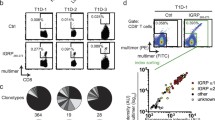Abstract
MHCI-peptide tetramer staining is an important technique in order to identify antigen-specific T cells within a heterogeneous cell population. The reagents may be used to isolate antigen-specific T cells and can help identify their role in disease. Here, we describe how to make tetramer from peptide:MHC monomers together with a protocol for staining antigen-specific cell populations with advice on generating a complementary antibody phenotyping panel.
Access this chapter
Tax calculation will be finalised at checkout
Purchases are for personal use only
Similar content being viewed by others
References
Altman JD, Moss PA, Goulder PJ et al (1996) Phenotypic analysis of antigen-specific T lymphocytes. Science 274(5284):94–96
Wooldridge L, Ekeruche-Makinde J, van den Berg HA et al (2012) A single autoimmune T cell receptor recognizes more than a million different peptides. J Biol Chem 287(2):1168–1177
Weichsel R, Dix C, Wooldridge L et al (2008) Profound inhibition of antigen-specific T-cell effector functions by dasatinib. Clin Cancer Res 14(8):2484–2491
Wong FS, Karttunen J, Dumont C et al (1999) Identification of an MHC class I-restricted autoantigen in type 1 diabetes by screening an organ-specific cDNA library. Nat Med 5(9):1026–1031
Lieberman SM, Evans AM, Han B et al (2003) Identification of the beta cell antigen targeted by a prevalent population of pathogenic CD8+ T cells in autoimmune diabetes. Proc Natl Acad Sci U S A 100(14):8384–8388
Wong FS, Siew LK, Scott G et al (2009) Activation of insulin-reactive CD8 T-cells for development of autoimmune diabetes. Diabetes 58(5):1156–1164
Acknowledgement
This work was supported by a Medical Research Council (grant number G0901155) to FSW and a Diabetes UK PhD studentship to JAP. We acknowledge the NIH Tetramer Core Facility (contract HHSN272201300006C) for provision of MHC | peptide tetramers.
Author information
Authors and Affiliations
Corresponding author
Editor information
Editors and Affiliations
Rights and permissions
Copyright information
© 2015 Springer Science+Business Media New York
About this protocol
Cite this protocol
Pearson, J.A., Wong, F.S. (2015). Identification of Islet Antigen-Specific CD8 T Cells Using MHCI-Peptide Tetramer Reagents in the Non Obese Diabetic (NOD) Mouse Model of Type 1 Diabetes. In: Gillespie, K. (eds) Type-1 Diabetes. Methods in Molecular Biology, vol 1433. Humana Press, New York, NY. https://doi.org/10.1007/7651_2015_295
Download citation
DOI: https://doi.org/10.1007/7651_2015_295
Published:
Publisher Name: Humana Press, New York, NY
Print ISBN: 978-1-4939-3641-0
Online ISBN: 978-1-4939-3643-4
eBook Packages: Springer Protocols




